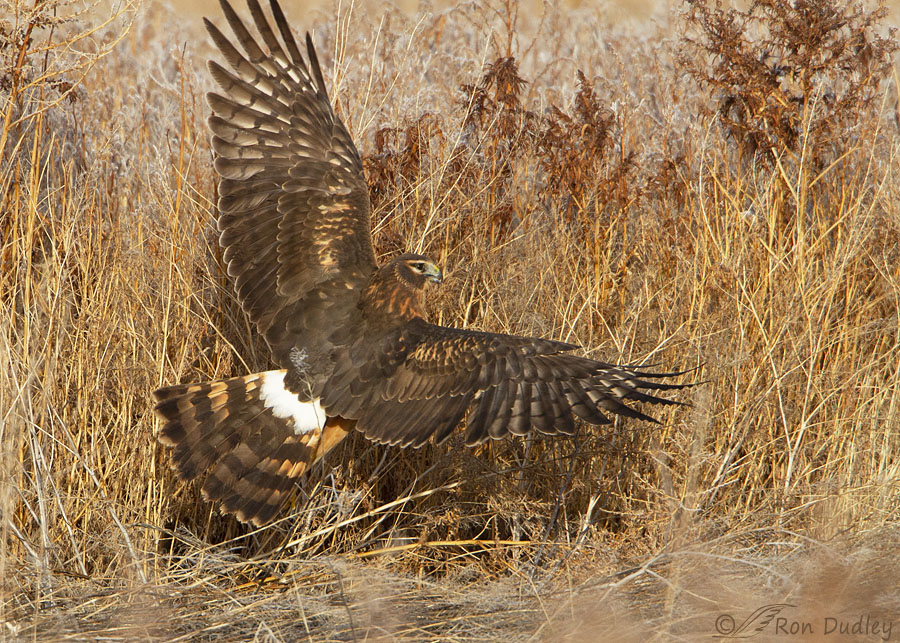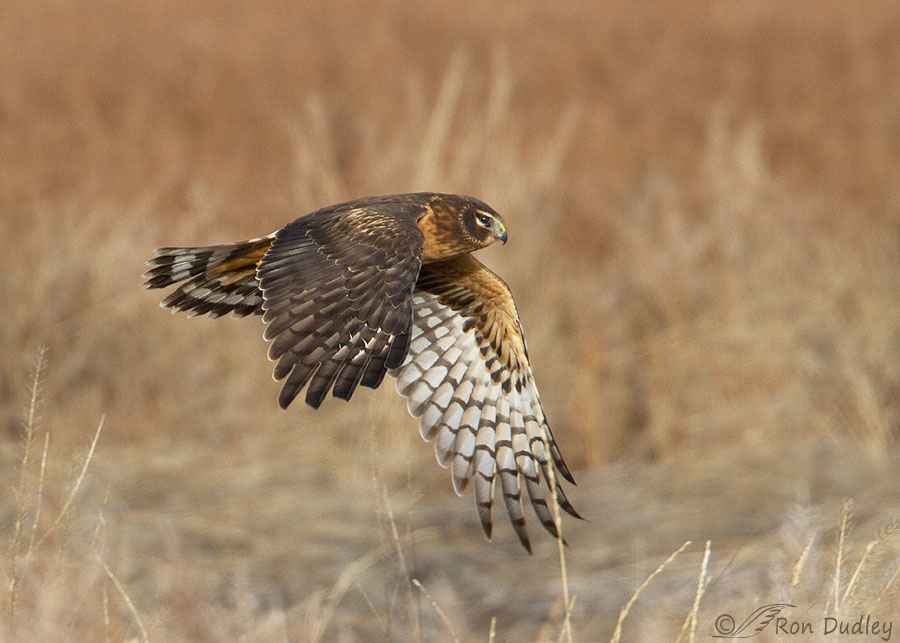One takeoff shot and one flight shot. I think the takeoff posture I captured is pretty special, even if I did bugger it up.
Occasionally I review my files from the current date on previous years as a predictor of what photo opportunities might be available to me now. Usually I don’t go back very far but this time I did and found these two harrier photos taken on the morning of November 20, 2009 that I’ve never posted before.

1/2000, f/7.1, ISO 500, Canon 7D, Canon EF 500mm f/4L IS II USM + EF 1.4 III Extender, not baited, set up or called in
This Northern Harrier at Farmington Bay WMA was perched on the ground directly in front of a wall of vegetation that it was facing only a couple of inches in front of the bird. I knew that unless it turned around before taking off its takeoff would likely be pretty interesting because it couldn’t take off directly into the vegetation so it would have to do some fancy wing work to become airborne.
So you can imagine how disappointed I was when I clipped a wing after waiting for a long time for the harrier to take off. I captured a dynamic takeoff posture, a wonderful dorsal view of all of its flared flight feathers in good light and a perfect head turn but I clipped three wing primaries.
But when I rediscovered the image last night I enjoyed seeing it so I thought some of my readers might appreciate a look at it too.

1/1600, f/7.1, ISO 640, Canon 7D, Canon EF 500mm f/4L IS II USM + EF 1.4 III Extender, not baited, set up or called in
Exactly 30 minutes later I found what may have been the same harrier again and this time I didn’t clip any body parts.
When I find images like these I’m always reminded (and surprised) by how long I’ve been photographing birds. I actually started my bird photography ‘career’ a little over two years before these photos were taken.
It’s been a wild and very enjoyable ride.
Ron


The beauty overcomes any notice of your perceived faults. I am reminded of the Native American weavers who deliberately create some small defects so as not to displease the Great Spirit which alone is perfect.
I’ll take Harriers any day, wings clipped, blunted or even “soft.” So fascinating to watch them hunt and glide low over the still-undeveloped lots on the edge of our city limits. These are beautiful images, beautiful bird(s).
So fascinating to watch them hunt and glide low over the still-undeveloped lots on the edge of our city limits. These are beautiful images, beautiful bird(s).
Thanks, Chris. I feel the same way about harriers, as evidenced by my vanity plate.
I try very hard to appreciate what your audience delights in. I only wish that I could enjoy it like all of you do. Thank you for sharing your thoughts and observations. I enjoy it so much – from the outside looking in.
Alice, I don’t consider you on the outside- you’re one of us.
Ron – With yesterday’s turkeys displaying and today’s Harrier in full bloom, you’ve got some serious “Who’s the fairest of them all?” competition going!
We were at Bosque del Apache in NM 4 weeks ago and the Harriers were hunting like crazy. Thanks to you, I knew what they were, and was able to appreciate their gorgeous faces and white rumps. The photos today fill my heart with joy again. Thanks!
That white rump is sure helpful with ID isn’t it, Carolyn. That’s one of the first field marks I learned for any species, many years ago.
The first shot is spectacular! Definitely a wall-worthy shot, clipped primaries and all! Gorgeous!!!
After reading Judy’s comment, I tried to look at the other markings on the neck and coverts. The angle is tough, but the markings in the second shot seem different enough to say that they’re two individuals. In this case, I’d say “two in the bush” is much better!
Yeah, I wasn’t very happy with myself Marty – especially since I had lots of time to prepare myself to avoid the clip and I still did it.
I can just hear the words you said when you discovered that clipped wing. From my perspective at least it is a very small bugger up. What an amazing take off – and the bird in flight is spectacular too.
Thanks, EC. Yup, I suspect you know those words.
Love both these shots. Harriers can be very unpredictable as they fly low over the ground looking for prey. I have often struggled to get good full frame shots without clipping etc. At least to me not an easy task.
Everett, in flight they’re not an easy subject for any of us. They’re so erratic!
The wingtips in question in the second shot appear to me to be so very close in value and hue to the vegetation they overlap that they “disappear”, but are
actually still there, I think….I especially appreciate the clarity and distinct
contrast in the bird’s facial markings in these 2 shots– handsome and “fierce” !
“handsome and “fierce””
I agree, Kris. Because the facial profile of harriers is quite different from that of most hawks some folks don’t appreciate them as much in photos. I’m not one of those folks.
Great shots! I know you hate to clip wings, but sometimes it almost adds to the sense of dynamism, I think. Anyway, these are wonderful, and I especially like the lovely strip of white at the top of the harrier’s tail feathers.
Cathy, that white rump patch of Northern Harriers is a distinctive field mark that’s often used to ID them, especially in flight.
WOW! Wonderful image of the Harrier clipped wing be damned! Beautiful position/rich feather colors, and, tho standing out from the vegetation, blending with it VERY well. 2nd shot is also beautiful. Appears that the tips on the primaries on it’s right wing are “blunted” compared to the left. Glad you pulled these up!
2nd shot is also beautiful. Appears that the tips on the primaries on it’s right wing are “blunted” compared to the left. Glad you pulled these up!
“Appears that the tips on the primaries on it’s right wing are “blunted” compared to the left”
Good eye, Judy. I hadn’t noticed that and it confuses me. That blunting effect often occurs when there’s motion blur in the wingtip but in this photo the wing is sharp.
And if the feathers on the wing really were blunted maybe it’s a different bird in the second shot because those feathers aren’t blunted in the first shot.
Just caught my eye being quite different from the left. Right wing feathers on the 1st bird definitely aren’t blunted.
That’s delightful! I got a vicarious thrill as he was submerged on his back and flapping his wings. I wonder if I can do anything that exciting today?
Thank you, Alison.
The coverts in the first photo look like smoldering embers. Wonderful display of feathers in both photos. I’m impressed by Judy’s astute observation differentiating the primaries. They like as if they were intentionally trimmed.
Lyle, I’m thinking those coverts might be more worn than the rest of the plumage but I’m not sure..